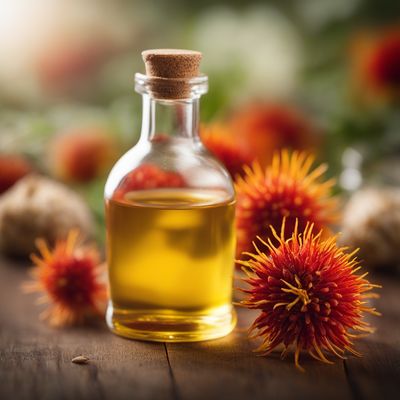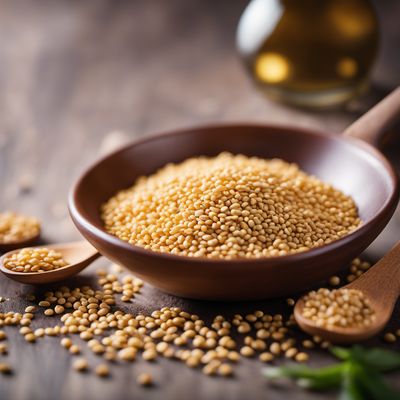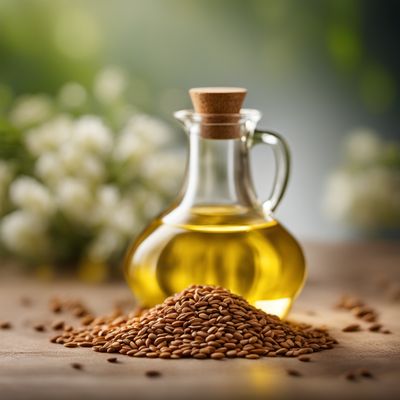
Ingredient
Seed oils
The Versatile World of Seed Oils
Seed oils are extracted from the seeds of plants and are known for their distinct flavors, colors, and nutritional profiles. Ranging from light and mild to rich and robust, these oils add depth and complexity to a wide range of dishes. They can be used for sautéing, frying, baking, or as a finishing touch in dressings and marinades. Some popular seed oils include sesame oil, sunflower oil, pumpkin seed oil, and flaxseed oil.
Origins and history
Seed oils have been used for centuries in various cultures around the world. Sesame oil, for example, has a long history in Asian cuisine and is a staple in dishes like stir-fries and dressings. Sunflower oil, on the other hand, has been cultivated for thousands of years and was highly valued by Native American tribes. The historical significance of seed oils varies depending on the region and the specific seed.
Nutritional information
Seed oils are a good source of healthy fats, vitamins, and minerals. They provide essential fatty acids, such as omega-3 and omega-6, which are beneficial for heart health. Additionally, seed oils contain vitamin E, an antioxidant that helps protect cells from damage. While the nutritional composition varies among different seed oils, they generally contribute to a well-balanced diet when used in moderation.
Allergens
Some seed oils, such as sesame oil, may trigger allergic reactions in individuals with sesame seed allergies. It is important to read labels carefully and consult with a healthcare professional if you have any known allergies or sensitivities.
How to select
When selecting seed oils, look for cold-pressed or expeller-pressed options, as these methods help retain the natural flavors and nutrients of the seeds. Check the expiration date to ensure freshness, and opt for oils stored in dark glass bottles to protect them from light damage. Additionally, consider the intended use of the oil and choose one that complements the flavors of your dish.
Storage recommendations
To maintain the freshness and quality of seed oils, store them in a cool, dark place away from direct sunlight and heat sources. Seal the bottle tightly after each use to prevent oxidation. Refrigeration can help extend the shelf life of some seed oils, particularly those high in polyunsaturated fats like flaxseed oil. However, be sure to bring refrigerated oils to room temperature before using to avoid solidification or cloudiness.
How to produce
Seed oils can be produced by growing the corresponding seed-bearing plants, such as sesame, sunflower, pumpkin, or flax. These plants require specific growing conditions, including adequate sunlight, water, and well-drained soil. With proper care and cultivation, home gardeners can enjoy the satisfaction of producing their own seed oils.
Preparation tips
Seed oils can be used in a variety of ways in the kitchen. They can be used for sautéing vegetables, frying foods, baking bread or pastries, or as a flavorful addition to dressings, marinades, and sauces. When using seed oils, it's important to consider their smoke points, as some oils are better suited for high-heat cooking while others are best used for drizzling or finishing dishes.
Culinary uses
Seed oils are widely used in cuisines around the world. Sesame oil is a key ingredient in Asian dishes, adding depth and flavor to stir-fries, noodles, and dressings. Sunflower oil is commonly used for frying and baking due to its neutral taste. Pumpkin seed oil is popular in Central European cuisine, particularly in Austria and Hungary, where it is drizzled over salads or used as a finishing touch for soups. Flaxseed oil is often incorporated into smoothies, salad dressings, or used as a nutritional supplement.
Availability
Seed oils are commonly available in grocery stores, supermarkets, and specialty food stores worldwide. They are cultivated in various regions, including Asia, Europe, North America, and South America.
More ingredients from this category » Browse all

Maize oil, edible
Golden Elixir: Unveiling the Secrets of Maize Oil

Safflower seed oil, edible
The Golden Elixir: Unveiling the Secrets of Safflower Seed Oil

Sesame seed oil, edible
The Golden Elixir: Edible Sesame Seed Oil

Almond oil
Liquid Gold

Hemp seed oil
Nature's Elixir

Rape seed oil, edible
The Golden Elixir: Edible Rapeseed Oil

Peanut oil, edible
Liquid Gold: Unveiling the Versatility of Peanut Oil

Linseed oil
The Golden Elixir: Linseed Oil

Cotton seed oil, edible
The Versatile Cotton Seed Oil

Soya bean oil, refined
The Versatile Oil: Refined Soya Bean Oil

Grape seed oil
The Versatile Elixir

Sunflower seed oil, edible
Golden Elixir from the Sun